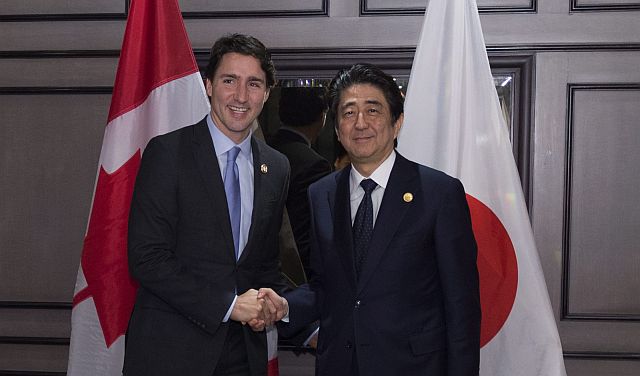
Canadian Prime Minister Justin Trudeau (left) and Japanese Prime Minister Shinzo Abe pose for a photo as they take part in a bilateral meeting on the margins of the Apec summit in Manila. (AP PHOTO)
The South China Sea disputes may not have been touched or even mentioned in the summit of leaders of the Asia Pacific Economic Cooperation but it proved to be among the hot topics on the sidelines.
Japan’s Prime Minister Shinzo Abe met for the first time the newly elected prime minister of Canada Justin Trudeau in a formal bilateral meeting, and discussed regional issues including the maritime rows in the East and South China Sea.
“(Abe) explained the region’s situations including the East China Sea and South China sea. He would like to promote the cooperative relationship with Canada in order to promote peace and stability in the region,” Yasuhisa Kawamura, press secretary of Japan’s ministry of foreign affairs and Abe’s spokesperson, told reporters in a news briefing yesterday.
Kawamura said Abe told Trudeau that Japan has been supporting the freedom of navigation patrols in the South China Sea led by the United States and shared his position on the disputes.
The tensions in the region have continued to worsen as China unabatedly constructed artificial islands on the reefs in the contested sea, part of which is part of the Philippines’ exclusive economic zone.
Kawamura at the briefing explained Japan’s “three principles of the rule of law at sea” which was proposed by Abe during his speech at the Shangri-la Dialogue in Singapore in 2014.
“First, states shall make and clarify their claims based on international law. Second, states shall not use force or coercion in trying to drive their claims. Third, states shall seek to settle dispute by peaceful means,” he said.
The Philippines has a pending arbitration case before the United Nations to challenge China’s nine-dash line claims in the South China Sea, where it stands to lose 80 percent of its exclusive economic zone.
Japan, which has been vocal in its support to the Philippines, will serve as an observer during the second round of oral hearings on the merits at the Hague in the Netherlands on Nov. 24 to 30.
Disclaimer: The comments uploaded on this site do not necessarily represent or reflect the views of management and owner of Cebudailynews. We reserve the right to exclude comments that we deem to be inconsistent with our editorial standards.
